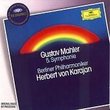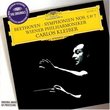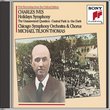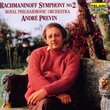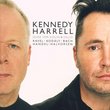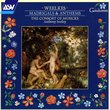| All Artists: Lowell Liebermann, Glasgow BBC Scottish Symphony Orchestra, Stephen Hough Title: Liebermann: Piano Concertos Members Wishing: 0 Total Copies: 0 Label: Hyperion UK Release Date: 6/10/1997 Album Type: Import Genre: Classical Styles: Forms & Genres, Concertos, Instruments, Keyboard Number of Discs: 1 SwapaCD Credits: 1 UPC: 034571169668 |
Search - Lowell Liebermann, Glasgow BBC Scottish Symphony Orchestra, Stephen Hough :: Liebermann: Piano Concertos
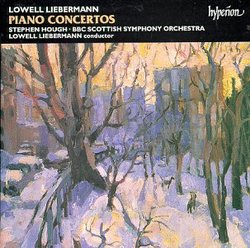 | Lowell Liebermann, Glasgow BBC Scottish Symphony Orchestra, Stephen Hough Liebermann: Piano Concertos Genre: Classical
|
Larger Image |
CD DetailsSimilarly Requested CDs
|
CD ReviewsSpectacular Concertos Played Spectacularly!!! mahlerii@aol.com | Richfield, MN | 08/11/1999 (5 out of 5 stars) "These concertos are very user-friendly. However, they exhibit two different style charactaristics: the 1st concerto is sparse and economical, the 2nd romantic, full and big. The first concerto is not unlike Bartok or Stravinsky, but without the acidity. There are small themes which are repeated quite a bit, so you don't feel lost-you know what the composer is talking about. The slow movement is a very simple song with sparse accompaniment, and the last movement is a hellish, goulish dance with much bravura from the soloist. The second concerto has a kinship with Rachmaninov and Prokofiev with a little touch of the americanisms of Gershwin and a little Copland. The form is unusual: a large first movement, a plucky scherzo, a serious slow movement and short but recapitulatory finale which brings the themes of the concerto again. Here the orchestration is opulent, the pianist called upon to exhibit splashes of display. The end of the concerto is one of times where you just feel lifted "out of your seat"! Hough is one of todays master pianists, and he does not disappoint here-Lieberman wrote these concertos for him. The composer is the conductor here, and he leads the BBC Scottish Orchestra admirably, and the sound is spacious and brilliant. This CD is too short-Hough should have recorded more of Liebermann's Album for the Young, but it also leaves you wanting more." A star ascending William Ward | Springfield, IL United States | 06/09/2002 (5 out of 5 stars) "If you ever wonder who will be the great composers of the early 21st century, you can start your list with Lowell Liebermann. It's hard to remember that at one time, people actually looked forward to hearing the latest works by the composers of the day. For the past 50 years or so, the public has usually gone to the concert hall with dread when new music was on the program -- or they didn't go at all. Liebermann, on the other hand, is the type of composer you want to hear again and again.That doesn't mean his music is easy or obvious -- just that he cares what it sounds like and doesn't view composition as a mathematical equation to be solved. The first concerto, a relatively early work, has more of the thorniness that was de rigeuer in music schools. But the finale is a wild, frenzied dance macabre, quite memorable. The second is written on the grand scale, with cascading piano passages, lush orchestration, etc. You'll hear passages that make you think of Rachmaninoff or Prokofiev or Shostakovich or others, but it's none of these. It seems that Liebermann has assimilated the best the 20th century had to offer and has gone on from there. One day, "Liebermann 2" will be a landmark. Buying new, unfamiliar music can be frustrating. But I assure you, this is a silk purse, not a sow's ear." Threading various styles together - successfully Alex Serrano | Perrysburg, Ohio United States | 03/06/2002 (5 out of 5 stars) "I was introduced to Liebermann's 2nd piano concerto a couple of weeks ago in Toledo, Ohio as played by the local symphony and Stephen Hough as pianist. As a standing ovation greeted the performance, the composer made an appearance on stage to get his due recognition. The performance was so brilliant, that maybe some of the details of the music where lost in the glare.
Liebermann has composed a brilliant work - combining romantic sweeps, toccata passages, and moments of near silence - it seems that rachmaninov, prokofiev, ravel, and schoenberg sat together to write this work. And by no means it lacks in originality, his greatest merit has been the ability to put this conglomerate together in such a way that it works and also is unrecognizable as any well performed music. The 2nd concerto is gaining acceptance in the standard repertoire and so is Liebermann's music - deservedly so. The first concerto and the accompanying solo works are also fine works in their own, but pale in comparison to the 2nd concerto. The first concerto works also, but for my personal taste i could not find much to hold on to. But those who favor Bartok or Ravel's concerto for the left hand will love this work. In regards to the pianist, Liebermann could not find a better match than Stephen Hough for this work. The writing, obviously virtuosic, is handled brilliantly by Hough and the dark introspective passages are played with attention to detail and reserve. And the live performance i attended was even better! The recorded sound captures the bbc scottish symphony orchestra in top form. It is so heartwarming to hear new music performed with so much care and attention - i surely hope Liebermann continues to get the success works as these should entitle him to." |

 Track Listings (13) - Disc #1
Track Listings (13) - Disc #1
